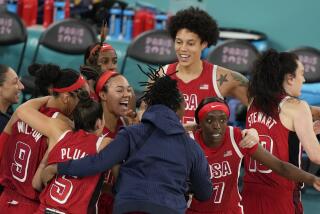U.S. gymnasts soar again with women’s team gold medal
LONDON — This is what the Olympics were for the U.S. women’s gymnastics team.
Golden.
It was McKayla Maroney nailing a vault that went so high in the air it seemed she should use an oxygen mask. Golden.
PHOTOS: U.S. wins gold in women’s gymnastics
It was Kyla Ross, who is still only 15 years old, fighting to hold every swing on the uneven bars; and defending world champion Jordyn Wieber, who was disconsolate and sobbing after she failed to make the Olympic all-around finals, muscling through her floor exercise routine. Golden.
It was Gabrielle Douglas, nicknamed the “Flying Squirrel” for her soaring release moves on the uneven bars, holding on to each one. Golden.
And finally it was Alexandra Raisman, often overlooked on the U.S. team, dissolving into happy tears even before she finished her final routine on the floor with her exuberant performance to the Hebrew folk song “Hava Nagila.” Golden, absolutely golden.
The U.S. women scored 183.596 and won the team gold medal Tuesday at the North Greenwich Arena by a whopping 5.066 points over the silver medalists from Russia. Romania took the team bronze, and the defending champion Chinese were sobbing on the sidelines, a badly beaten fourth.
This is only the second team gold for the United States and the first on foreign soil. The other came in 1996 in Atlanta, when Bela Karolyi ran the team. Now Bela’s wife, Martha, is in charge, and Bela gave her his full appreciation. “This is her team,” he said. “It’s all her.”
The Americans were great front-runners in the final. The team competed first on vault. As if destiny wanted a good joke, the first American competitor was Wieber. She had left the same floor in tears two days earlier when her error-filled qualification performance kept her from advancing to the all-around final.
But Wieber landed a solid vault, and the 17-year-old let herself smile when a score of 15.933 was posted. (The maximum score possible on an exercise varies
according to difficulty.)
Douglas came next and was a little better, soaring through the air, her toes pointed, her knees unflinching on the landing. She earned a 15.966, but that seemed almost nothing after Maroney finished. Even though she is competing with a broken toe, it seemed as if Maroney launched herself so high she might never come down.
And when she did land, a person in the crowd yelled, “Holy Maroney.” Her score of 16.233 was, by far, the highest of the night on the apparatus, and from there no team was ever within a point of the Americans.
John Geddert, the personal coach for Wieber, said this team gold was some good consolation for Wieber, the defending world all-around champion. She stunningly didn’t reach the Olympic all-around final after finishing third among the Americans in qualifying; only two women per country can qualify.
“And this is the best team all-time,” Geddert said. “Others might disagree, the 1996 team might disagree. But this is the best team. Difficulty-wise, consistency-wise, this is USA’s finest.”
That 1996 Olympic team earned the name “Magnificent Seven” for its Atlanta performance.
Maroney, the 16-year-old from Long Beach, came up with a name for this team. “Fierce Five,” she said. “We’re the fiercest ever and we’re all babies.”
Teams can have only five members now, down from 1996’s seven, and none of these five is older than the 18-year-old Raisman.
The youngest is 15-year-old Ross, from Aliso Viejo, who kept pretending to take a bite out of her new jewelry. The gold medal seemed almost heavier than Ross. “It feels so fabulous,” she said. “That’s a good word, right?”
The Americans have now earned a team medal in six straight Olympics. Only Romania, which has been on the Olympic podium every year since 1976, has a better record.
Floor exercise became a team celebration for the Americans after the Russians, up just before them, imploded. Both Anastasia Grishina and Ksenia Afanaseva had major falls, and by the time Raisman started her dancing, tumbling party, all the U.S. girls were jumping and hugging.
“I was screaming so loud I almost passed out,” Maroney said.
Of all the Americans, competitors and coaches, it was Martha Karolyi who was the calmest at the end.
“This is a fantastic achievement,” she said. “But we don’t need to get our noses up. We will just keep working hard. Without work, you don’t achieve anything.”
twitter.com/mepucin
More to Read
Go beyond the scoreboard
Get the latest on L.A.'s teams in the daily Sports Report newsletter.
You may occasionally receive promotional content from the Los Angeles Times.






